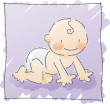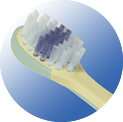baby teeth
What can I do when my child is teething?
Teething of primary (baby) teeth usually occurs from six months to age 3. Your child’s gums may feel sore when teeth erupt. Many children like a clean chilled teething ring, cool spoon, or cold wet washcloth. Alternatively, you may massage the gums with a small toothbrush and cool water.
When should I start to clean my baby’s teeth?

What is the best to use to clean my baby's teeth?

Are baby teeth important to save? Won’t they fall out anyways?
Primary teeth (or "baby" teeth) are very important for your child’s health. They serve many functions until they are replaced between age of 6 to 12 years old. They help children speak clearly and chew their food. They are  an essential part of children’s smile and self-esteem. They also aid in forming a path that permanent teeth can follow when they are ready to erupt. If infections (dental caries, or “cavities”) of the primary teeth are left untreated, the infection can cause severe pain and/or spread to the newly erupted permanent teeth. At times, untreated dental infection can spread to other parts of the body and can be life threatening.
an essential part of children’s smile and self-esteem. They also aid in forming a path that permanent teeth can follow when they are ready to erupt. If infections (dental caries, or “cavities”) of the primary teeth are left untreated, the infection can cause severe pain and/or spread to the newly erupted permanent teeth. At times, untreated dental infection can spread to other parts of the body and can be life threatening.
